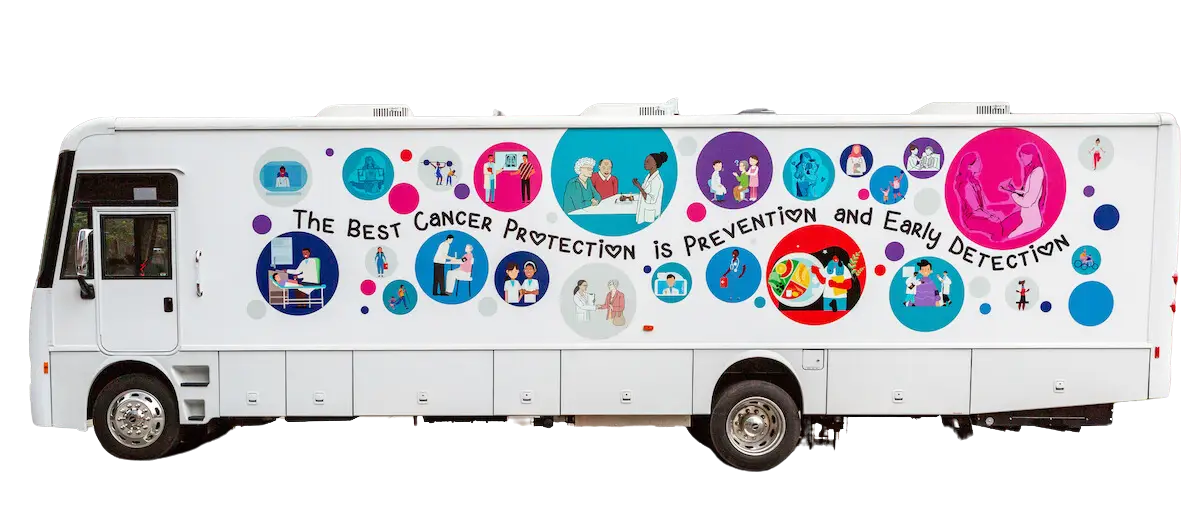Education: Colorectal Cancer
The Importance of Colonoscopies
A colonoscopy is a test in which a thin, flexible tube with a light and a video camera on its tip is placed in your colon to search for polyps.
It’s the most effective way to detect them. Your treatment team will prescribe a clear-liquid diet and medication to clear out your bowel during the 24 hours before the procedure. You’ll also be sedated during the exam. Your doctor can usually remove any polyps that are detected, which then go to a pathologist (a doctor who specializes in diagnosing disease) for examination and analysis.
There are other screening tests for colon cancer in addition to colonoscopy, listed below. You should note that these tests are not as thorough as a colonoscopy. If polyps or tumors are suspected based on these tests, you will still need to have a colonoscopy.

Additional Colon Cancer Screening Tests
Flexible Sigmoidoscopy
Fecal Immuno-chemical Test
Fecal Occult Blood Test
Stool DNA Test
Double-contrast Barium Enema
Virtual Colonoscopy
Colorectal Cancer Resources
Learn more with Information about screening courtesy of the National Cancer Institute and American Cancer Society
DID YOU KNOW?
ScreenNJ Screening Statistics
Why Should You Get Screened?
One in two men and one in three women will develop cancer in their lifetime
Early diagnosis of cancer offers the best chance for successful treatment. When cancer care is delayed or inaccessible there is a lower chance of survival, greater problems associated with treatment, and higher costs of care.
Visit our Education page to learn more about various cancer types and screening options.
Types of Screenings Available:
- Breast Cancer
- Cervical Cancer
- HPV-Related Cancers
- Colorectal Cancer
- Genetically-Linked Cancers
- Lung Cancer
- Prostate Cancer
- Skin Cancer
Get the Assistance you need
Learn More About Patient Navigation
Patient navigators are trained, culturally competent healthcare professionals who work with patients, families, physicians and other healthcare providers to ensure cancer patients’ needs are appropriately and effectively addressed.
Get connected to a navigator to gain assistance with qualification, scheduling, transportation, and more.
Discover our mobile health unit
Free Cancer Screenings and Care Coordination for the uninsured and under-served across New Jersey
Now Offering:
- Patient navigation for care coordination
- Education and outreach
- Supportive services to address social determinants of health
- History and physical examinations
- Laboratory testing
- Referrals and authorizations


Who Qualifies for Screening?
The New Jersey Cancer Education and Early Detection Screening Program (NJCEED) is part of the New Jersey Department of Health.
NJCEED provides comprehensive screening services for breast, cervical, prostate, and colorectal cancer. The services include education, outreach, early detection, case management, screening, tracking, and follow-up. Breast, cervical, prostate, and colorectal cancers can be treated more effectively when found early.
Persons eligible for these services must be at or below 250% of the Federal Poverty Level and be uninsured or under-insured. For more information, please call 1-800-328-3838 or locate a screening location here.
Screening for cancer is covered with no deductible or co-pay by many insurance plans including Medicare, and patients with no insurance may be able to receive recommended cancer screenings at their NJ CEED agency or at other ScreenNJ partner sites. Visit our Frequently Asked Questions page to learn more.
